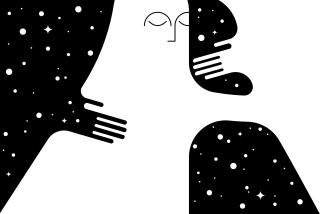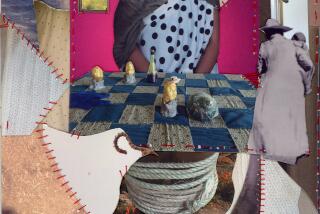Dream Therapy Wakes Up to Scientific Approach
- Share via
SAN DIEGO — A North County woman woke up recently with this startling announcement:
“I dreamed I saw a man dressed in a chicken suit,” she said. “He laid down on a sidewalk on a crowded downtown street and started having convulsions.”
While this confession might once have set off a rash of interpretations within the confines of a crowded living room of friends, today it is more likely to be met with laughter and maybe even some good-natured taunting.
These are the late ‘80s, after all, and dreams don’t create the same excitement they did during the more introspective ‘60s and ‘70s.
In San Diego, though, a handful of educators, scientists and students haven’t completely given up on the idea of analyzing dreams as a way to solve real-life problems. Some lament the days of “touchy-feely” dream discussions; others cheer today’s more scientific approaches.
“We’ve taken some of the mystery out of dreams,” said Laverne Johnson, who teaches a dream-analysis class at San Diego State University. “People today don’t find dreams to have the mystical, occultish feel they did during the ‘70s. Maybe dreaming about flying doesn’t have anything to do with sex. Maybe a snake isn’t always a phallic symbol in dreams.”
Johnson has been teaching his class for 15 years, after several years running the Navy Department’s sleep laboratory in San Diego. He remembers a time when psychotherapists would routinely introduce dream discussions into patient sessions.
“There was a lot of time spent discussing hidden meanings over dreams that spilled over into the book press and then into the general public,” Johnson said. “But therapists today seem to be less concerned with dreams than they were 20 years ago.”
Ron Lane, a member of the psychological services department at the University of California at San Diego, can vouch for that statement. Lane says his patients rarely bring their dreams up in sessions anymore unless prompted. If anybody would prompt, it would be Lane, who was involved extensively in dream and sleep research during the ‘70s.
“I think the decline in interest in dreams is a function of the general swings a culture goes through,” Lane said. “Back in the ‘60s, the culture began to change and traditional means lost their credibility. It became the pop thing for people to look for alternative sources. People realized the seeds of creative ideas often showed themselves in dreams.”
That “pop culture” attitude of the ‘70s was perfect for the onslaught of dream interpretation books during the decade. When that fad started to fade, dream and sleep researchers found reasons why. Nearly all use phrases such as “a more conservative atmosphere” and “the conventional structure of the yuppie movement” and “a new generation aimed at personal prosperity.”
‘Ransack Their Soul’
James McCamey has taught psychology classes at Mesa College for 30 years, with an emphasis on dreams for most of that time. He remembers an era when people in sensitivity groups would choose another member of the group and “ransack their soul” when it came to dreams.
“We called it peeling the onion,” McCamey said. “But the students I have now are more conservative. I remember a time when they would take to the streets to express themselves. Now I’m not sure how to whip the class into a frenzy.”
Enrollment in McCamey’s dream classes hasn’t slowed down, though, perhaps indicating that students still want to know what their dreams mean. Maybe, McCamey said, they’re simply looking for a more condensed, private way to analyze them.
To keep things from becoming too uncomfortable for this new breed, McCamey seats his students in a circle and asks them to share their dreams in a group effort.
“I let them know, though, that, if things start getting too personal, they don’t have to talk about it anymore,” McCamey said. “It doesn’t do any good to impose on someone’s dream.”
While the “fad” of dream interpretation has slowed down, for whatever reasons, the science of dream and sleep analysis is certainly wide awake. The Friends of Jung Society in San Diego is a respected group, whose members include academics and interested citizens. The Jungians follow the theories of Carl Jung, the noted Swiss psychiatrist.
Meanwhile, dream theorists such as Francis Crick could be enjoying the decline in heavy dream talk among the people. Crick is the Salk Institute scientist who earned a Nobel Prize as a physical chemist for his work in deoxyribonucleic acid (DNA) research, but who also developed an interest in the Rapid Eye Movement function of sleep.
In extremely simplistic terms, Crick believes dreams during that period are only a byproduct--that they are nothing more than “bizarre intrusions . . . brief incidents that often appear to rise for no apparent reason.”
That quote is from a paper Crick published in 1986. He doesn’t talk to the press these days; his secretary said it distracts him from his work. But those who follow dream research closely are well aware of Crick’s theories.
“I heard him speak once,” Johnson said. “I told him I admired his tenacity, and that I didn’t know if I would get up in front of a group of nuclear physicists and tell them about their work.”
Lane says that Crick should be taken seriously, though, citing respected theories that dreams are indeed just background noise, and it’s what we make of them that actually makes sense.
Scientific Approach
The greatest development in dream research, San Diego academics say, is the more scientific approach studies are taking.
“There is still no good way to record a dream except waking somebody up and asking what they are dreaming,” Johnson said. “Obviously, that isn’t a perfect scientific method. So we’ve moved from trying to understand the nature of sleep to looking at the pathology of sleep. Until we can get some breakthrough in recording dreams, we need to look more at the biological aspects of sleep.”
Most dream research done today is in the area of lucid dreaming, where the variable of manipulating your dreams is introduced. Most of the researchers here support the concept of lucid dream research, though many have reservations about manipulating people’s dreams to satisfy scientific quests. Some are also uneasy about everyday people learning to control dreams they perhaps should be letting loose.
Dreams, which are mentioned often in the Bible and have been a source of discussion dating back to Freud and beyond, will continue to attract even the most practical and respected members of the scientific community.
“I got away from dream research because I didn’t feel like I was making discoveries or generating new ideas from my work,” Lane said. “It was becoming repetitious, and somehow I needed to turn more outward. But I always promised myself I would come back to it. I still hope to come up with a clear idea in my mind of the functions dreams have and how they can be used to help us when we’re not asleep.”
More to Read
Sign up for Essential California
The most important California stories and recommendations in your inbox every morning.
You may occasionally receive promotional content from the Los Angeles Times.













